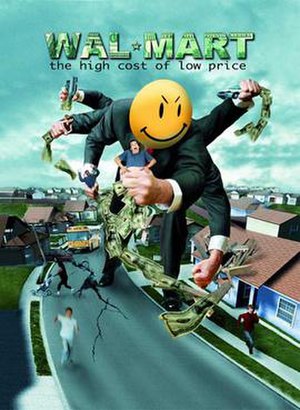Wal-Mart is a morally imperfect corporation.
Robert Greenwald’s 2005 film about it—Wal-Mart: The High Cost of Low Price—is morally imperfect propaganda.
Propaganda in itself is not bad, but Greenwald’s film could use a little smart analysis and some evenhandedness. Let it glorify labor unions all it wants. Let it approve of the interviewed man who asserts, “I think the government should have more control” over the company owing to Wal-Mart’s being a “monopoly.” What spells trouble for the film is Byron York’s charge in National Review magazine (Dec. 5, ’05) that the doc’s information is deceptive. The above comment about government control issues from a citizen of Middlefield, Ohio, where the family-owned H & H Hardware was ostensibly driven out of business by a newly built Wal-Mart store. Not so, says York: “H & H closed before Wal-Mart even opened in Middlefield”—three months before. And ineffective business decisions had a lot, if not everything, to do with it.
I don’t entirely trust the words of the Wal-Mart CEO and conference speaker whom Greenwald repeatedly shows us, but even less do I trust a knee-jerk propagandist. “Wal-Mart Drives Down Retail Wages $3 Billion Every Year” we read on the screen. Actually, it just might be illegal immigrants who are doing that—or will in the near future. In any case, I’m skeptical. York’s article tells us “there is . . . serious disagreement among economists about Wal-Mart’s effect on wages.” The High Cost of Low Price, however, is not interested in that. . .





Eventually, you had to figure that the left-wing anti-corporate documentary genre was going to produce a film as genuinely weakly made, poorly argued and naively knee-jerk in its political notions as conservative opponents of the genre have long accused its products of being. That film, sadly, is this film.
Somehow this documentary escaped my radar. I’ll have to check it out on Netflix. Not everyone likes Walmart but you can’t deny that they make it easier to make ends meet for millions of people with their low prices. The only thing I really don’t like about Walmart is that there are a lot of odd people shopping there. 🙂